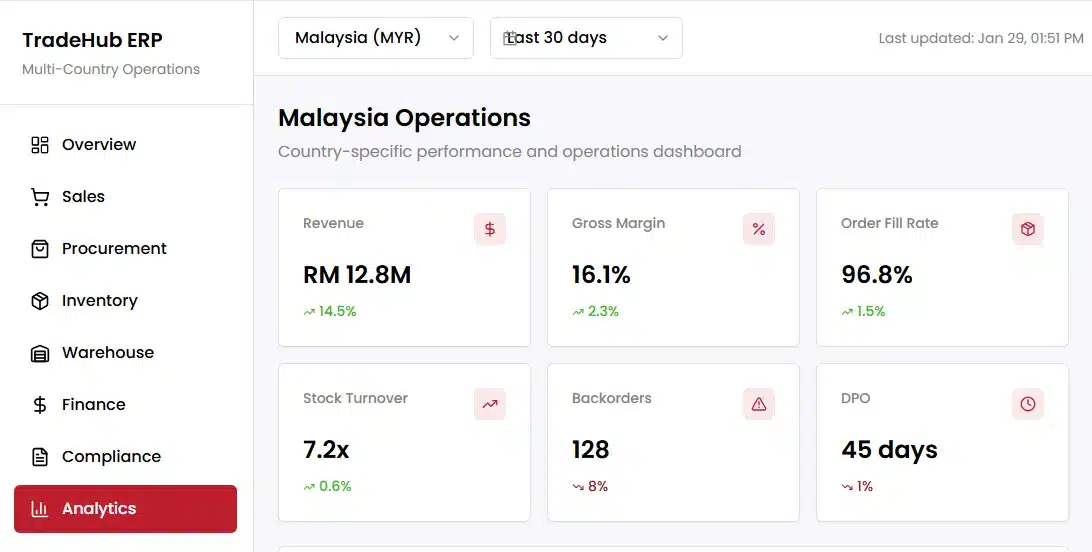As trading operations grow more complex and dynamic, businesses are increasingly turning to ERP software to streamline operations, ensure accuracy, and boost efficiency. From inventory management to order fulfilment, these systems play a vital role in automating workflows and minimising operational errors.
Implementing the right ERP solution not only saves time but also enhances productivity. It also improves team collaboration, supports regulatory compliance, and drives better business outcomes.
But with a wide range of ERP options available, how do you know which one is best suited for your trading business? Explore the 15 best ERP software solutions for trading companies, along with practical tips to help you choose the right system for your business needs!
Key Takeaways
|
What is ERP Software for Trading?
ERP (Enterprise Resource Planning) software for trading is a centralized system that manages and automates key business processes for trading companies. It integrates functions such as inventory management, sales, procurement, finance, and customer relationship management into a single platform.
By consolidating data and operations, ERP helps trading businesses gain better control over their resources, reduce manual work, and increase overall operational efficiency. ERP software provides real-time insights across departments, enabling faster decision-making and enhanced coordination.
15 Best ERP Software for Trading Business in Malaysia
After discussing the purpose of ERP software for trading, we compiled a list of 15 top-rated ERP solutions tailored explicitly for trading businesses. This guide is designed to help distributors, wholesalers, and trading companies identify the most suitable platforms for managing their operations effectively.
Each ERP system feature offers unique advantages and may have specific limitations, helping you determine which one best aligns with your business objectives. Discover our curated selection to elevate overall efficiency in your trading operations.
1. HashMicro
HashMicro’s Trading ERP Software provides a wide range of tools designed to streamline trading operations and enhance overall business performance. The system is equipped with intelligent automation that simplifies key processes while ensuring compliance with local regulations and business practices.
HashMicro’s ERP solution is well-suited for trading companies in Malaysia and beyond. It supports both general functions, such as inventory, sales, procurement, and finance for trading businesses, enabling better stock control, supplier management, and transaction accuracy.
HashMicro serves over 3,000 clients, including industry leaders such as McDonald’s and the Bank of China. This recognition highlights HashMicro’s significant role and growing impact in the ERP landscape for trading industries.
Here are the key features of HashMicro’s Trading ERP Software:
- Customer Retention Module: Manage extensive customer databases to enable personalized marketing efforts and effective customer segmentation.
- Finance and Invoicing Tools: Generate and manage invoices with customizable templates that reflect your brand identity.
- Purchase Management System: Streamline the ordering process with automated purchase workflows and multi-level approval settings for each request.
- Inventory Control Module: Track inventory in real-time, set automatic restock alerts, and align stock levels with supplier lead times and demand patterns.
- Bank Reconciliation: Automatically sync and reconcile payment data across multiple bank accounts for enhanced financial accuracy.
- Analytics Dashboard: Access real-time business metrics and create detailed reports to support informed decision-making within one integrated ERP for a trading operations platform.
| Pros | Cons |
|
|
In terms of local compliance, HashMicro’s system is designed to align with Malaysia’s tax regulations, specifically the Service Tax (SST) requirements and the electronic invoicing (e-Invoice) mandate implemented by the Inland Revenue Board of Malaysia (LHDN).
By automating these regulatory processes, trading companies can ensure accurate tax filing and avoid legal penalties while maintaining transparent financial records.

2. Oracle NetSuite ERP
Oracle NetSuite for trading businesses, is a cloud-based ERP software for trading business solution. It helps trading companies streamline operations by automating key processes such as inventory, procurement, sales, and finance, while offering real-time visibility into performance.
| Pros | Cons |
|
|
3. ORION ERP
In the trading industry, ORION ERP offers comprehensive cloud ERP solutions tailored to streamline business operations. It is known for its accessibility and robust support, provided via phone, email, live chat, and ticketing systems.
Key features of ORION ERP include inventory and order management, procurement, accounting, CRM, supply chain automation, and real-time analytics.
| Pros | Cons |
|
|
4. Absolute ERP
Absolute ERP is an ERP solution designed to cater to Startups, SMBs, Mid-Market, and Enterprise-level businesses. The system stands out for significantly enhancing work quality, supporting efficient management, boosting productivity, and strengthening governance across operations.
Key features of Absolute ERP include inventory and warehouse management, procurement, production planning, and detailed reporting tools. These features enable businesses to streamline processes and make data-driven decisions in real-time.
| Pros | Cons |
|
|
5. Axanta ERP
Axanta ERP delivers tailored ERP software solutions for the trading industry. Comprehensive support channels are in place to back the platform, ensuring users receive reliable assistance throughout their operations.
Key features of Axanta ERP include sales and purchase tracking, CRM, financial accounting, barcode integration, multi-currency, and multi-location support.
| Pros | Cons |
|
|
6. Horizon ERP
Horizon ERP is a practical ERP software solution designed for trading businesses that require efficient handling of large volumes of invoices and extensive SKU management. With its integrated billing, inventory, and accounting modules, the software simplifies complex trading operations.
It offers a fast, dependable, and easy-to-maintain system, making it an ideal choice for distributors, retailers, and small manufacturers looking to optimize stock control, streamline transactions, and maintain accurate financial records.
| Pros | Cons |
|
|
7. Eresource ERP for Trading
Eresource ERP is an all-in-one solution tailored for trading businesses, offering a fully integrated suite of applications to manage core operations, including procurement, inventory, sales, finance, and customer relations.
Designed to enhance decision-making, the system provides real-time data and analytics that help businesses respond quickly to market demands and internal challenges. With its end-to-end capabilities, eResource ERP streamlines every stage of the trading process.
| Pros | Cons |
|
|
8. eLite ERP
eLite ERP is a cost-efficient ERP software designed specifically for small to medium-sized trading businesses looking to enhance their productivity without overspending. eLite ERP allows companies to transition smoothly from manual operations to a fully integrated digital system.
Its software supports essential trading functions such as inventory control, order processing, billing, and financial management, helping businesses streamline their daily operations.
| Pros | Cons |
|
|
9. Sage 300 Cloud
Sage 300 Cloud is a popular cloud-based business management solution tailored for small to mid-sized businesses, especially those in the trading sector. It seamlessly integrates essential functions, including finance, operations, sales, inventory, and customer service, into a unified platform.
Designed to handle the complexities of multi-location trading operations, Sage 300 Cloud ERP for trading streamlines supply chain processes, manages large volumes of transactions, and maintains real-time visibility into stock levels and financials.
| Pros | Cons |
|
|
10. Marg ERP 9+ Software
Marg ERP 9+ is a robust ERP designed to meet the needs of trading businesses, including retailers, distributors, and manufacturers. Its software offers an integrated, centralized platform to manage and streamline supply chain operations.
Its comprehensive tools help small and medium-sized enterprises (SMEs) stay on track with their business goals by ensuring efficient control over inventory, sales, purchasing, and accounting processes.
| Pros | Cons |
|
|
11. Expand smERP
Expand smERP is a cloud-based ERP solution specifically designed to support manufacturers and exporters with production and job workflow management. Built to align seamlessly with existing operations, Expand smERP enhances business efficiency by automating even the most complex tasks.
| Pros | Cons |
|
|
12. ERPNext
ERPNext serves as a robust ERP foundation for trading and also wholesale distribution software, offering flexibility and control by allowing users to choose their preferred hosting provider or self-host the system. ERPNext supports essential trading operations through features like inventory management, real-time reporting, and multi-currency support.
| Pros | Cons |
|
|
13. FACT ERP.NG
FACT ERP.NG is a comprehensive ERP solution designed to support trading businesses by streamlining operations across multiple functions, from managing the supply chain, procurement, and inventory to overseeing warehouse activities and fixed assets.
It also features tools for manufacturing oversight, financial management, and business intelligence, enabling accurate reporting and data-driven decisions. With its integrated and scalable system, FACT ERP.NG helps trading companies operate more efficiently and competitively.
| Pros | Cons |
|
|
14. Spectrum ERP
Spectrum ERP is a reliable and all-in-one ERP solution tailored not only for manufacturing SMEs but also highly beneficial for trading businesses. It offers robust business intelligence tools and mobile capabilities that enable users to stay informed and connected at any time, from anywhere.
For trading companies, Spectrum ERP features include procurement, sales order processing, supplier and customer management, GST-compliant accounting, reporting and analytics, and mobile access.
| Pros | Cons |
|
|
15. Roadmap ERP
Spectrum ERP is an end-to-end ERP software designed for trading businesses seeking operational efficiency and real-time control. With built-in business intelligence and mobile accessibility, it enables users to stay connected and make informed decisions on the go.
| Pros | Cons |
|
|
What are the Benefits of ERP Software for Trading?
ERP software provides a wide range of benefits for trading businesses seeking to remain competitive and efficient in today’s fast-paced market. Here are some key advantages your team can gain from implementing ERP software tailored for trading operations:
1. Business scalability
Having a comprehensive ERP system helps trading companies expand more easily by centralizing operations and providing real-time access to critical data. It allows businesses to manage increasing transaction volumes and expand into new markets without losing efficiency.
2. Efficient process management
ERP software streamlines various trading activities, including procurement, sales, inventory management, and order fulfillment, into a single, cohesive system. This integration reduces manual work, speeds up operations, and helps teams stay aligned across departments.
3. Improved accuracy and time-saving
By automating repetitive tasks and reducing reliance on spreadsheets, ERP systems minimize human error and significantly cut down the time required for data entry, reporting, and financial reconciliation.
4. Compliance and reporting support
Many ERP platforms include built-in tax rules and compliance features that align with local regulations. It ensures accurate reporting and minimizes the risk of non-compliance or costly audit issues.
5. Optimized inventory and cost control
ERP software provides visibility into stock levels, supplier performance, and procurement trends, enabling informed decision-making. It helps trading businesses plan purchases wisely, reduce excess inventory, and maintain healthy cash flow.
How to Choose the Right ERP Software for Your Trading Business
When selecting ERP software for your trading company, it’s essential to evaluate factors that impact performance, compatibility, and operational fit. Choosing the wrong solution can lead to inefficiencies, higher expenses, and missed opportunities.
Here are several essential considerations when choosing the right ERP software for the trading company:
- Understand your business requirements: Review your trading processes, transaction volume, and business complexity to inform your decision-making. A clear understanding of your operational needs ensures the software aligns with your workflow and supports critical functions.
- Compliance readiness: Select software that adheres to local financial regulations and tax policies. It minimizes the risk of penalties and supports accurate financial reporting.
- Multi-format and currency support: If your business operates internationally, ensure the ERP system can manage various currencies, languages, and file types to enhance collaboration and data consistency.
- Ease of use: Search for a solution with a user-friendly interface. It reduces your team’s training time and improves adoption across departments.
- Reliable vendor support: Select a provider that offers strong customer service, including onboarding assistance, troubleshooting, and regular updates. Reliable support keeps your operations running smoothly.
- Integration capabilities: Your ERP should integrate seamlessly with other essential systems, such as inventory management, CRM, and e-commerce platforms, to ensure a cohesive, automated business environment.
- Scalability for growth: Invest in software that can scale with your business. As your trading activities expand, the system should be able to handle increased data and complexity without requiring replacement.
- Customization options: Select an ERP software that allows you to configure it to your specific business workflows. Tailored solutions provide better alignment with your day-to-day operations.
Conclusion
Selecting the right ERP software is crucial for trading businesses seeking greater operational efficiency and sustainable growth. A well-fitted system helps simplify core processes, optimize resource planning, and reduce delays, so operations remain scalable as volume increases.
A trading-focused ERP platform typically integrates inventory, sales, procurement, and finance into a single workflow. With real-time visibility and automated reporting, teams can collaborate more quickly, reduce manual errors, and meet compliance requirements with more consistent data.
Book a free consultation to discuss your current workflow, identify key bottlenecks, and explore how an ERP system can help reduce operational risks while improving overall business performance.
Click Here to Get the Free Demo!
Frequently Asked Questions
-
What is the ERP system for stocks?
An ERP will help you view, calculate, and automate your stock levels, real-time inventory, and reorder points. For example, inventory items can be automatically ordered when data shows that demand for a particular SKU has reached a certain predetermined level.
-
How is ERP used in finance?
An ERP system can track, manage, consolidate, and report on all of an organization’s financial transactions, as well as automate many fundamental business processes. It serves as the basis for much of a company’s accounting work and its financial controls.
-
What systems do traders use?
An automated trading system (ATS), a subset of algorithmic trading, utilizes a computer program to generate buy and sell orders and automatically submits these orders to a market center or exchange.








































